Autumn Statement latest: Jeremy Hunt cuts National Insurance from 12% to 10% from January
Jeremy Hunt has cut the main rate of National Insurance by two percentage points in an Autumn Statement to kick-start economic growth in Britain.
He will bring in the measure for 27 million workers on January 6 through emergency legislation.
The Chancellor stressed that someone on the average salary of £35,000 will save over £450.
His first two personal NI tax cuts announced in the Autumn Statement were for the self-employed.
He also extended a huge tax break for businesses, announced welfare reforms to get more people into jobs, and announced that the freeze on the Local Housing Allowance would be lifted.
Read latest updates below...
Key Points
Key timings throughout the day
What could be in the Autumn Statement?
Live coverage ends
20:41 , Miriam Burrell
That's all for our live coverage tonight.
Goodnight.
No new funding for social care 'shameful'
19:34 , Miriam Burrell
Jeremy Hunt has gone from “hero to zero on social care”, according to campaigners who branded the absence of any new funding commitments to the struggling sector “shameful”.
The only mention of social care in this week’s autumn statement was to “reaffirm” the commitments made at the 2022 statement, when the Government pledged to make available up to £14.1 billion for the NHS and adult social care.
Age UK noted the 2019 pledge by then-prime minister Boris Johnson to “fix the crisis in social care once and for all” and said Wednesday’s statement was “a reminder of how desperately short the Government has fallen”.
Caroline Abrahams, charity director, said: “With this autumn statement the Chancellor, Jeremy Hunt, has gone from hero to zero on social care."
The Carers Trust said it was “shameful” than none of 110 measures announced by the Chancellor “gets anywhere near easing a social care crisis that is causing so much suffering for so many”.
Barely a mention of education in autumn statement, say unions
18:44 , Miriam Burrell
Teaching unions criticised the autumn statement for "barely mentioning" education after a year of bitter disputes over pay and warnings about the state of school buildings.
Daniel Kebede, general secretary of the National Education Union, warned of cuts to education provision because schools were not able to cope with cost increases in the coming years.
He said: “Investing properly in education is an urgent and overriding economic priority, yet what we have seen today is nothing of the sort.
"Just 3.9% of UK GDP is spent on education, compared to the OECD average of 5%. This was highlighted to Jeremy Hunt in a letter earlier this month from the leaders of four education unions.
"The Chancellor’s response is completely inadequate and makes a mockery of the Prime Minister’s repeated claim that education is at the heart of this Government’s priorities.
"It should be of great concern to Jeremy Hunt that 92% of mainstream schools will be unable to cope with cost increases in 2024/25. For 99% of secondary schools and 91% of primary schools, cuts to education provision are now inevitable."
Income tax could be next on the cards
18:31 , Miriam Burrell
Jeremy Hunt said he would look to cut income tax at the next budget “if it is responsible to do so”.
Asked whether taxes were going up or down under the current Government, the Chancellor told Sky News: “We haven’t got to the end of the Parliament yet, so I can’t answer that question.
“But what I can say is that my commitment to voters is that, when I had a chance to lighten the tax burden… I’m a Conservative, I believe in doing so.
“We have made a start. I don’t pretend, I’ve never pretended that we were going to get there in one go.
“But what we can say is that, now we’ve halved inflation, the economy has turned a corner, we can focus on the long-term growth, raising incomes and salaries for families up and down the country.”
Asked whether income tax could be cut in the spring budget, Mr Hunt said: “What I will do is exactly what I’ve done this time. If it is responsible to do so, if we can do so without increasing borrowing, then of course as a Conservative, I would like to bring down the tax burden.
“But I will only do so in a responsible way and one that doesn’t fuel inflation after the great success we’ve had in halving it.”
'It will take time to get taxes down', Hunt says
18:09 , Miriam Burrell
Jeremy Hunt has acknowledged that it "will take time to get taxes down", as he told Sky News he had "made steps" to grow the economy.
The Chancellor was asked about the UK's overall tax burden, which will remain at a record high despite a two percentage point cut to National Insurance.
Mr Hunt told Sky News: "If you're trying to say that it's going to take time to get taxes down to the level they were, then I agree.
"But what I said was when it was responsible to do so, when it wouldn't affect inflation, I would make a start.
"We've done that today and we are a party that believes if we want to grow the economy, then we need to have a lightly taxed economy, and we've made a step which, by the way, for someone on average earnings is going to be about £450, so it's not insignificant."
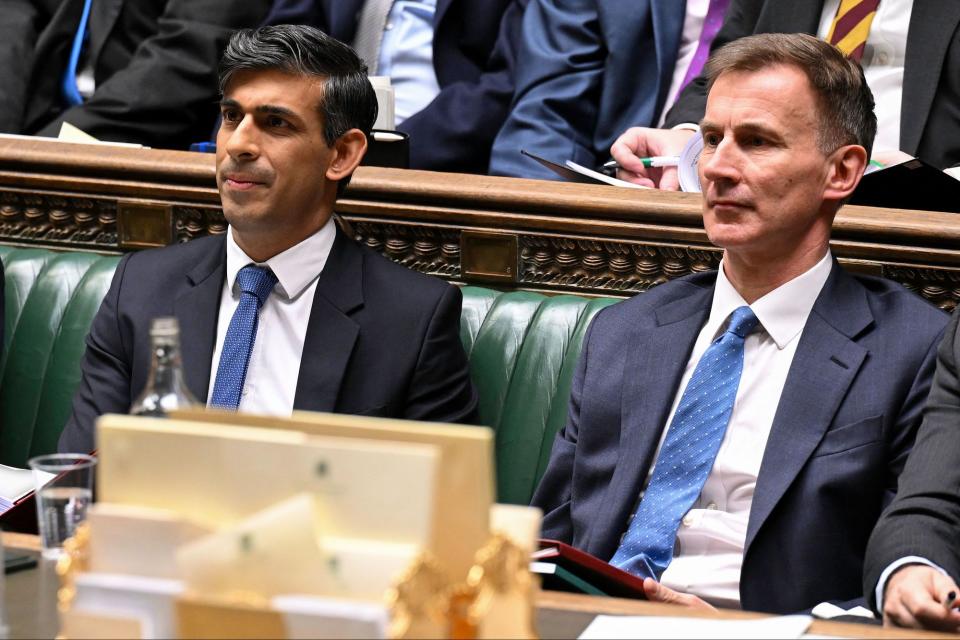
'Public sector cuts will mean longer NHS wait times'
18:00 , Miriam Burrell
More patients will be treated in corridors and “perilous” staffing levels are here to stay because of the Government’s plans for the public sector, nurses’ leaders warned.
Chancellor Jeremy Hunt told MPs the Government wanted a more “productive state” calling for an annual increase in productivity.
Royal College of Nursing Chief Nurse, Professor Nicola Ranger, said the Chancellor’s statement was “short-sighted, not long-term”.
She added: “The NHS faces a multibillion-pound deficit – giving away at least £5 billion in tax cuts in place of health spending confirms the NHS is no longer a priority for the Government.
“The public sector cuts the Chancellor wants instead will mean even longer waits, more patients treated in corridors and perilous staffing levels here to stay."
Sadiq Khan slams autumn statement as 'deeply anti-London'
17:05 , Miriam Burrell
London Mayor Sadiq Khan had been hoping for funding for Transport for London (TfL), affordable housing and policing to be increased by particular amounts, but said the Chancellor’s autumn statement "fell woefully short".
Mr Khan: "This Autumn Statement was an opportunity for the Chancellor to recognise the important role that London plays in creating jobs and growth across the UK, while providing vital support to Londoners with the ongoing cost of living crisis. Instead, what we’ve seen is another deeply anti-London budget.
"Whether on TfL capital funding, desperately needed affordable housing or providing the Met Police with the funding it needs, today’s statement again fell woefully short.
"Londoners continue to suffer from higher prices at the shops, higher energy bills and soaring housing costs because of the Government’s failure and mismanagement."
Are you better off?
16:33 , Neil Hunter
Use the calculator below to find out if you will be better off after today's Autumn Statement.
Unfreezing of local housing allowance to boost renters
16:32 , Miriam Burrell
Richard Lane, director of external affairs at StepChange Debt Charity, said the unfreezing of local housing allowance would boost many renters.
"We’ve seen record rent rises over the past year and housing benefit was simply not keeping up. It’s also good to see the Chancellor recognising the need to uprate benefits in line with inflation. However, it’s important that the Government doesn’t give with one hand and take with the other.
“Those on the lowest incomes feel the effect of high inflation the most and there was no confirmation from the Chancellor that any cost-of-living support would be extended beyond April 2024, which is a blow to financially vulnerable households.
"Energy bills also remain much higher than they were two years ago...support, both in terms of a co-ordinated write-off of debts incurred over the past two years for those who can’t pay, alongside a social tariff for those on low incomes, is badly needed.
"Without interventions on energy debt and a real-terms rise in benefits, the cost-of-living crisis will cast a long shadow on household finances for years to come."
Tax cuts not enough to stop 'biggest tax raising Parliament in modern times'
16:13 , Miriam Burrell
The Chancellor’s tax cuts will not prevent this from being the biggest tax raising Parliament in recent times, the Institute for Fiscal Studies has said.
Paul Johnson, the think tank’s director, said: “That was not the quiet autumn statement we were promised. Before assessing the specifics, it’s worth getting a few things straight.
“The public finances haven’t meaningfully improved. The growth outlook has weakened. Inflation is expected to stay higher for longer. Higher inflation pushes up tax receipts by more than it pushes up spending on debt interest or social security benefits.
“But rather than use the proceeds to ease the ongoing ‘fiscal drag’ effects of threshold freezes, or to compensate public services for higher costs, the Chancellor opted to cut other taxes – most notably national insurance and corporation tax.
“These tax cuts won’t be enough to prevent this from being the biggest tax raising Parliament in modern times.”
Pictured: Jeremy Hunt delivers autumn statement
15:46 , Miriam Burrell
The Chancellor in the House of Commons
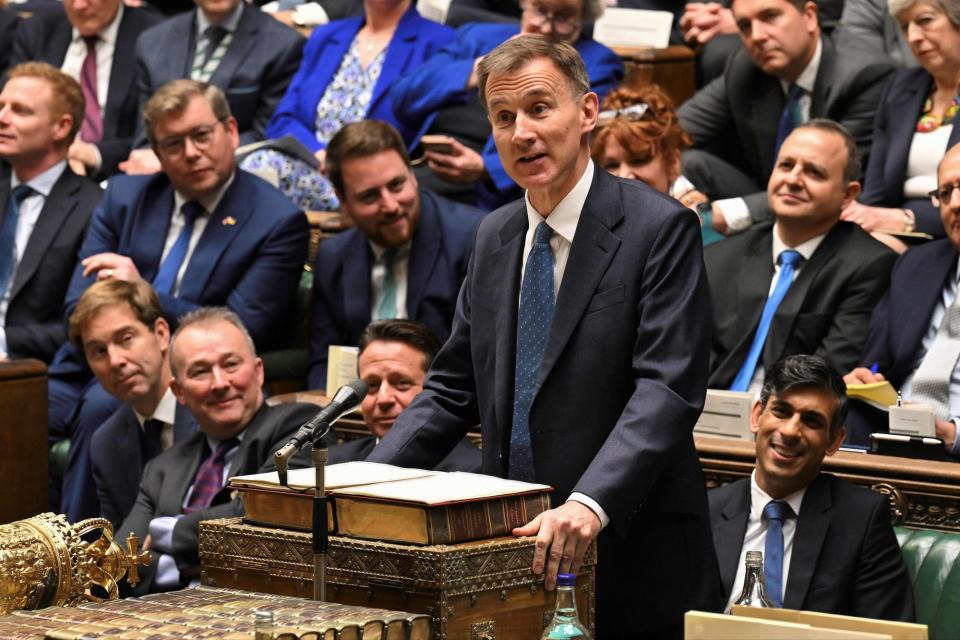
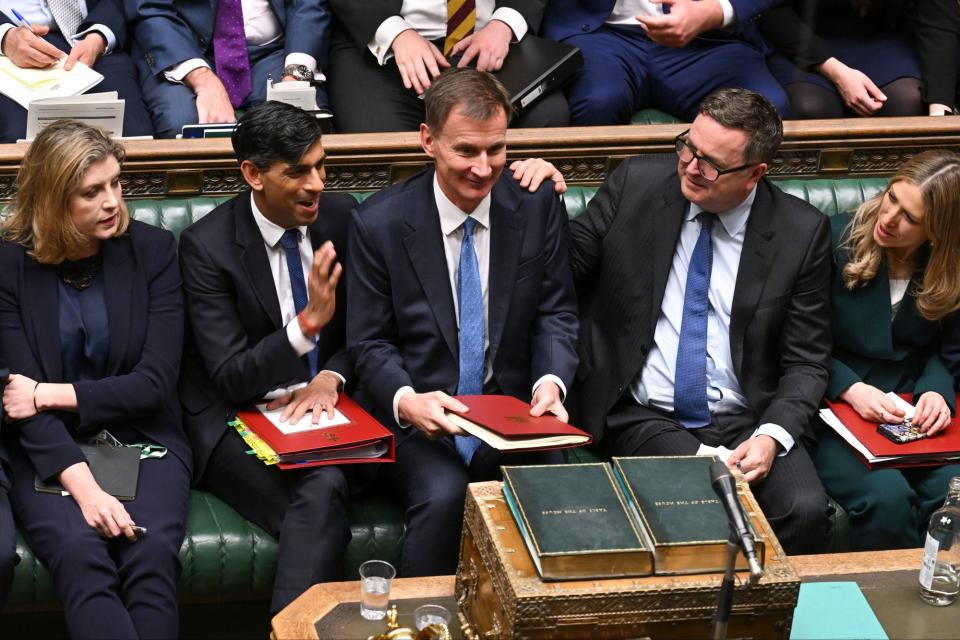
What does the autumn statement mean for my finances?
15:42 , Miriam Burrell
– A cut to national insurance (NI)
Millions of workers will benefit from a 2p cut in NI as Jeremy Hunt began to ease the tax burden ahead of the general election.
The Chancellor said the two percentage point reduction in the main rate will save someone earning £35,000 more than £450 and the change would benefit 27 million people.
– Minimum wage to rise in April
The national living wage will rise to £11.44 in April next year, the Treasury has announced.
The rate is currently £10.42 for workers aged over 23, but the new figure will apply to 21 and 22-year-olds for the first time.
– State pension going up
Pensions will be increased by 8.5% in line with average earnings to £221 a week from April, maintaining the so-called “triple-lock” policy whereby the amount paid is whichever is highest out of average earnings growth, Consumer Prices Index (CPI) inflation or 2.5%.
– Tobacco duty going up, alcohol duty frozen
Duty on hand-rolling tobacco will rise by an additional 10% but duty on beer, cider, wine and spirits will frozen until August next year.
– Nothing announced on energy or cost-of-living support
The Chancellor has not announced any additional help with energy bills or the cost of living.
There is another payment for pensioners this winter, and one for low-income people on benefits in the spring.
Starting level of GDP 'revised substantially higher' by ONS
15:39 , Miriam Burrell
David Miles, member of the Office for Budget Responsibility’s Budget Responsibility Committee, said recent upgrades by the Office for National Statistics to GDP data has impacted its latest growth forecasts.
He said: “The reason why the growth outlook in the near-term is a little bit worse is a reflection of a bit of good news is that the starting level of GDP had been revised substantially higher by the ONS.
“It was revised up 3 per cent against what was thought in March.
“Rather than in March, where we thought there was spare capacity, there is perhaps more excess demand.
“We are starting from a position of more economic activity than we thought.”
VAT-free shopping for tourists could be reviewed in future
15:15 , Miriam Burrell
The decision to axe VAT-free shopping for tourists visiting the UK could be reviewed in future, Jeremy Hunt said.
The Chancellor said the Government was “looking again at the numbers” after duty-free shopping was scrapped at the 2022 autumn statement, which has led some to describe the current situation as a “tourist tax”.
Conservative MP Geoffrey Clifton-Brown raised the issue in the Commons following Mr Hunt's autumn statement.
He told MPs: “There was no mention in his excellent budget of the tourist tax. British tourists going abroad spend billions of pounds benefitting those countries, and yet we actively discourage – and figures show that we are doing so – we actively discourage high-spending tourists coming from abroad and benefitting our shops and hospitality venues.”
Mr Hunt responded: “Can I reassure him that we want to do everything possible to make our tourism and our retail industry competitive and we want to encourage international visitors.
“When we changed policy on this particular issue a year ago, it was because the cost was around £2.5 billion-a-year and we didn’t think we could afford to continue doing it, but we are looking again at the numbers in the light of the most recent data and we can see what has happened to comparative shops in Paris and Milan, and we will review that and see if it is still that expensive, and I hope it isn’t.”
What is national insurance and when do you pay it?
14:44 , Rachael Burford
National insurance rates have been cut from 12 per cent to 10 per cent by Chancellor Jeremy Hunt.
Read our explainer on what that means for 27 million workers here.
Sadiq Khan: Renter support 'dwarfed by deepening London housing crisis'
14:05 , Rachael Burford
The Mayor of London, Sadiq Khan said: “Whether on TfL capital funding, desperately-needed affordable housing or providing the Met Police with the funding it needs, today’s statement again fell woefully short.
"Londoners continue to suffer from higher prices at the shops, higher energy bills and soaring housing costs as a result of the Government’s failure and mismanagement. The limited additional help being provided by ministers today is dwarfed by the deepening housing crisis affecting Londoners all across our city.
“What the Government needs to realise is that proper investment in London would not only help deliver more affordable housing, better transport and vital services that Londoners need, but also help power our national recovery, generate prosperity, and speed up the growth of high-paid jobs.”
NHS Confederation: 'Missed opportunity to help health service'
13:58 , Rachael Burford
Responding to the Chancellor's Autumn Statement, Dr Layla McCay, director of policy at the NHS Confederation, said: “This Autumn Statement has been a missed opportunity from the Chancellor to get the NHS back on track following the huge impact that strikes have had on patient care andalready-tight budgets.
“Independent experts have said that the costs so far stand at £1.7bn yet only £800m has been allocated and mainly by raiding budgets elsewhere, which will cause long-term harm to the NHS’s ability to transform its services.
“The government has been clear in its messaging that this mini budget was to be a plan to drive economic growth yet in downgrading the NHS as a priority, it has failed to recognise the important connection between the health of the nation and its prosperity."
Liberal Democrats: Autumn Statement 'a deception' after years of Tory tax hikes
13:55 , Rachael Burford
Responding to the Autumn Statement, Liberal Democrat Treasury spokesperson Sarah Olney said: "This is a deception from Jeremy Hunt after years of cruel tax hikes on hard-working families from this government.
"Conservative chaos has sent mortgages and tax bills soaring, today’s announcements won’t even touch the sides.
“Worse still was the deafening silence on health. These dismal forecasts show the economy is on life support and reducing NHS waiting lists is the shot in the arm needed.
“It is a no-brainer that we need people off waiting lists and back to work, yet this Conservative government simply doesn’t care."
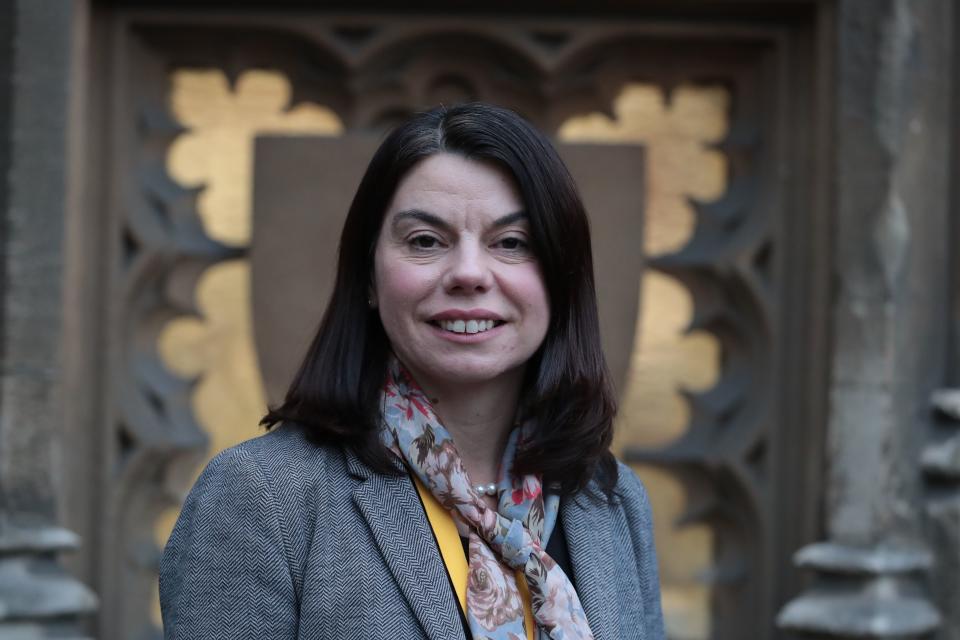
Hunt's 'go for growth' strategy
13:53 , Rachael Burford
Jeremy Hunt vowed to “reward” workers as he cut business and personal taxes in a dash for economic growth ahead of a likely election next year.
The moves were part of a go-for-growth strategy by Mr Hunt and Rishi Sunak, and signalled a sharp shift from their priority of slashing inflation despite warnings that price pressures remain.
Read our full round up of the Autumn Statement here.
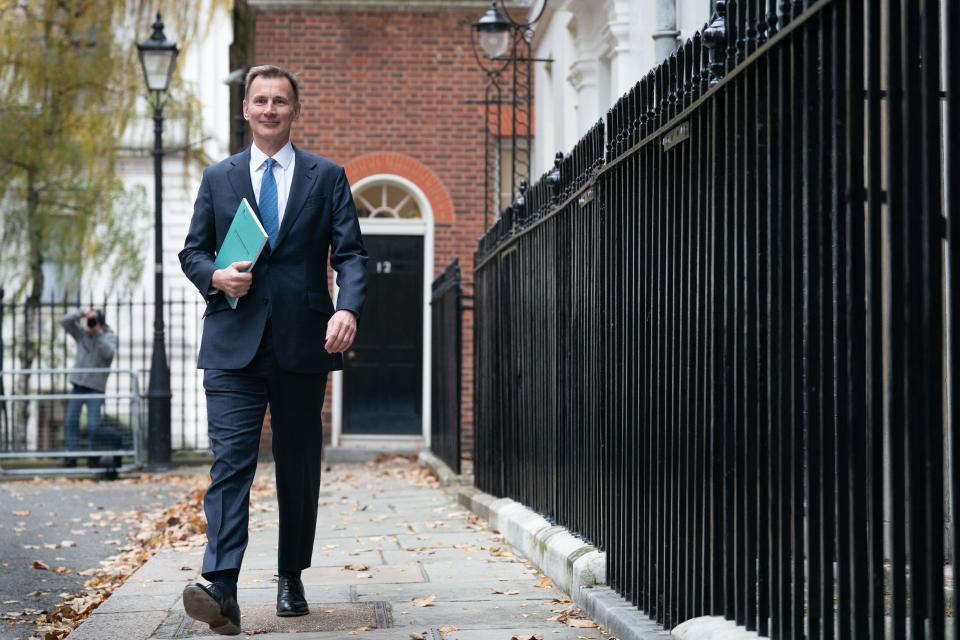
Labour highlights mortgage bomb
13:48 , Rachael Burford
Ms Reeves highlights the impact last year's doomed mini-budget was still having n her response to Mr Hunt's announcement.
Then PM Liz Truss and her chancellor Kwasi Kwarteng announced the biggest package of tax cuts in half a century, which resulted in a crash in the markets.
The pound plunged to a record low against the dollar, and the central bank was forced to intervene.
Inflation and interest rates soared, putting particular pressure on mortgage holders.
Bills spiralled for homeowners, including in Prime Minister Rishi Sunak’s Yorkshire seat and the Chancellor’s own South West Surrey constituency.
“In Richmond, North Yorkshire, homeowners are facing £200 more in monthly mortgage costs”, Ms Reeves says.
“In the Chancellor’s own constituency, though maybe not for long, families with a mortgage will see an average increase in mortgage costs of £420 a month because of Conservative economic failure.
“Working people just don’t have that sort of money lying around. This is what we’ve come to after thirteen years of this government...This Tory economic recklessness is not a thing of the past. The British people are still paying the price.”
Labour: Tories taking working people 'for fools'
13:38 , Rachael Burford
Labour accuses the Government of attempting to take working people “for fools” with a “cynical” Autumn Statement.
Shadow chancellor Rachel Reeves says that growth had "hit a dead end" under the Tories, adding Jeremy Hunt's autumn statement had "lifted the lid on 13 years of Conservative failure".
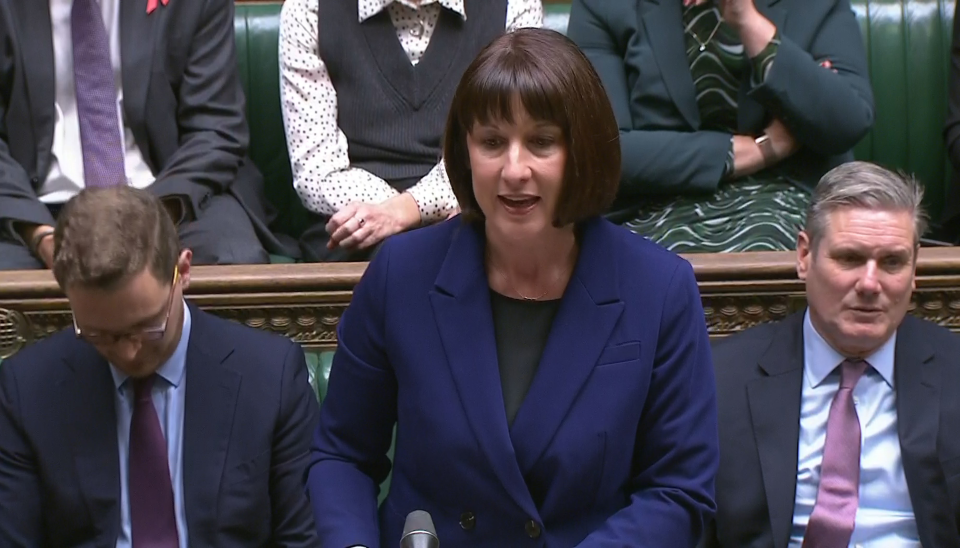
"Biggest tax cut in modern history'
13:35 , Rachael Burford
Mr Hunt finishes his statement saying: "We are delivering… … the biggest business tax cut in modern British history... … the largest ever cut to employee and self-employed National Insurance… … and the biggest package of tax cuts to be implemented since the 1980s."
27 million workers to get tax cut
13:31 , Rachael Burford
The Chancellor said he would cut the main rate of national insurance for workers from 12% to 10% as of January.
It will "help 27 million" workers by putting extra money in their payslips.
Mr Hunt told the Commons he would bring forward urgent legislation to Parliament to introduce the cut in national insurance for employees "from January 6, so that people can see the benefit in their payslips at the start of the new year".
He added: "It means someone on the average salary of £35,000 will save over £450. For the average nurse, it is a saving of over £520 and for the typical police officer it is a saving of over £630 every single year.
Crackdown on benefit claimants
13:26 , Rachael Burford
Benefits will be raised in line with inflation, Mr Hunt has confirmed, but there will be a crackdown on those who can work but do not.
"We will provide a further £1.3bn of funding to offer extra help to the 300,000 people who have been unemployed for over a year."But we will ask for something in return. If after 18 months of intensive support jobseekers have not found a job, we will roll out a programme requiring them to take part in a mandatory work placement to increase their skills and improve their employability.
"And if they choose not to engage with the work search process for six months, we will close their case and stop their benefits."
First personal tax cut announced
13:18 , Rachael Burford
Abolishing Class 2 National Insurance will save the some self-employed workers £192 a year.
"Today, after careful consideration and in recognition of the contribution made by self-employed people to our country, I can announce we are abolishing Class 2 National Insurance altogether, saving the average self-employed person £192 a year."
Planning reforms
13:16 , Rachael Burford
A £110m government investment over this year and next to deliver "nutrient mitigation schemes" that will unlock 40,000 new homes, the Chancellor says.
"We will invest £32m to bust the planning backlog and develop fantastic new housing quarters in Cambridge, London and Leeds which will lead to many thousands of additional dwellings," Mr Hunt says.
"We will allocate £450m to the Local Authority Housing Fund to deliver 2400 new homes.
"And we will consult on a new Permitted Development Right to allow any house to be converted into two flats provided the exterior remains unaffected."
'A more productive state not a bigger one'
13:09 , Rachael Burford
"I want the public sector to increase productivity growth by at least half a percent a year, the level at which the size of our state starts to reduce as a proportion of GDP," says Mr Hunt.
"The private sector is more productive in countries like the United States, Germany and France because it invests more – on average 2 percentage points more of GDP every year.
"The 110 measures I take today help close that gap by boosting business investment by £20bn a year.
"They do not involve borrowing more and ramping up debt as some advocate. Instead, they unlock investment with supply side reforms that back British business in the following areas."
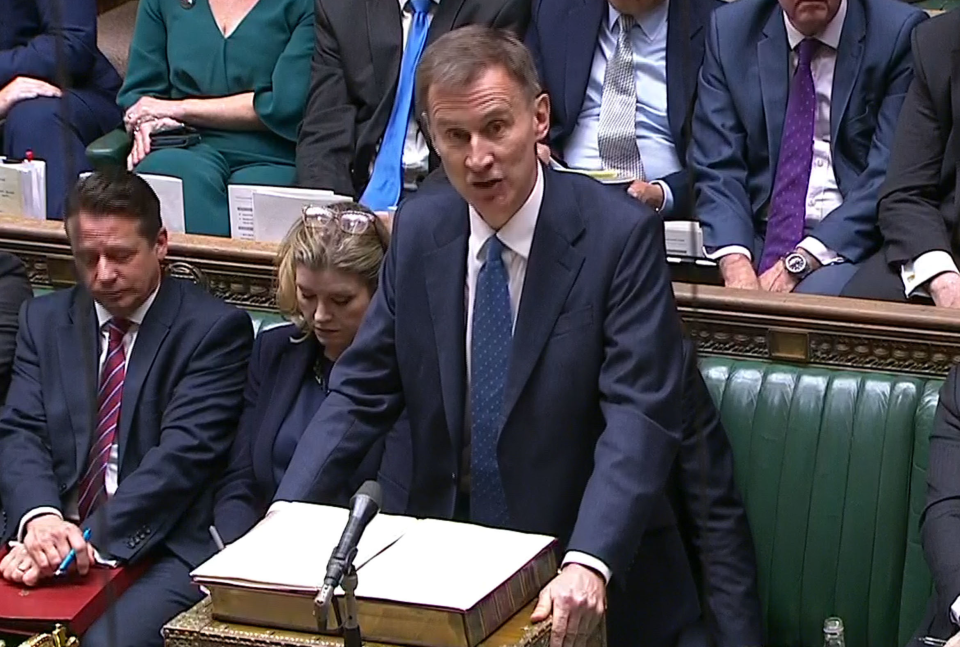
Support for veterans
13:05 , Rachael Burford
We want to support a group of people "to whom we owe our freedom", says the Chancellor.
"I will extend National Insurance relief for employers of eligible veterans for a further year and provide £10m to support the Veterans’ Places, Pathways and People programme."
Debt reduction
13:02 , Rachael Burford
UK has the second lowest government debt in the G7, says Chancellor.
"Before I took difficult decisions at last year’s Autumn Statement, debt was predicted to rise to almost 100% of GDP by the end of the forecast.
"Since then, the economy has outperformed expectations and I have taken difficult decisions to reduce borrowing. As a result, headline debt is now predicted to be 94% of GDP by the end of the forecast.
The OBR today forecast underlying debt will be 91.6% of GDP next year, 92.7% in 2024-25, 93.2% in 2026-27, before declining in the final two years of the forecast to 92.8% in 2028-29."That is lower in every year compared to forecasts in the Spring. We therefore meet our fiscal rule to have underlying debt falling as a percentage of GDP in the final year of the forecast, with double the headroom compared to the OBR’s March forecast."
State pension up 8.5%
12:57 , Rachael Burford
Jeremy Hunt confirms the government's commitment to the triple lock, meaning pensions will rise by 8.5%.
"It has helped lift 250,000 older people out of poverty since it was instituted in 2011 and been a lifeline for many during a period of high inflation," the Chancellor says.
"There have been reports that we would uprate it by a lower amount to smooth out the effect of high public sector bonuses in July, but that would have been particularly difficult for one million pensioners whose only income is from the state."
Bad news for smokers, good news for drinkers
12:54 , Rachael Burford
Tax on tobacco will increase, the Chancellor says.
But alcohol duty is being frozen in a boost for pubs.
"Although I am going to increase duty on hand-rolling tobacco by an additional 10% above the tobacco duty escalator, I know that for many people going to the pub has become more expensive," Mr Hunt says.
" I have listened closely to the persuasive arguments on alcohol duties.
"I’ve also listened to defenders of the great British pint.
"So as well as confirming our Brexit Pubs Guarantee, which means duty on a pint is always lower than in the shops, I have decided to freeze all alcohol duty until August 1st next year. That means no increase in duty on beer, cider, wine or spirits."

Renter help - housing allowance uplift
12:51 , Rachael Burford
The Chancellor announces he lifting the cap on housing allowance.
"Because rent can constitute more than half the living costs of private renters on the lowest incomes, I have listened closely to many colleagues as well as the Institute for Fiscal Studies, the Resolution Foundation, Citizens Advice UK and the Joseph Rowntree Foundation who said unfreezing the Local Housing Allowance was an ‘urgent priority.’
"I will therefore increase the Local Housing Allowance rate to the 30th percentile of local market rents. This will give 1.6 million households an average of £800 of support next year."
Benefits boost
12:49 , Rachael Burford
Mr Hunt: "Today I add four further measures to help with the cost of living. Firstly, for those on the lowest incomes. I understand the concerns some have about the effect on work incentives of matching benefit increases to inflation.
"I know there has been some speculation that we would increase benefits next year by the lower October figure for inflation.
"But cost of living pressures remain at their most acute for the poorest families. So instead, the government has decided to increase Universal Credit and other benefits from next April by 6.7% in line with September’s inflation figure, an average increase of £470 for 5.5m households next year. Vital support to those on the very lowest incomes from a compassionate Conservative government."
Work rewards
12:41 , Rachael Burford
Mr Hunt hints that the expected tax cuts with be announced.
"Today’s measures do not just remove barriers to investment, they reward effort and work. I will go through the measures in three parts.
"In the first, I will use updated OBR forecasts to show the progress we are making against the Prime Minister’s economic priorities.
"The second part sets out growth measures to back British business. Finally, I conclude with measures to make work pay."
Difficult decisions in difficult times
12:38 , Rachael Burford
"After a global pandemic and energy crisis, we have taken difficult decisions to put our economy back on track, the Chancellor says.
"We have supported families with rising bills, cut borrowing and halved inflation. Rather than a recession, the economy has grown.
"Rather than falling as predicted, real incomes have risen. Our plan for the British economy is working. But the work is not done. Others have proposed a more short-term approach."
Chancellor about to announce tax and growth plan
12:36 , Rachael Burford
The Chancellor has stood up in the Commons.
He starts by saying "Happy Birthday" to his wife who is "looking younger every year", according to Mr Hunt.
Mental Health support
12:17 , Rachael Burford
Sir Keir focuses much of his questioning on a lack of mental health support in Britain.
Millions are on NHS waiting lists for months before receiving treatment, he says.
This includes two million children.
The PM replies that the government is expanding patient choice by using the private sector.
He brands the Labour policy a "total mess" and accuses the party of flip-flopping on the use of the independent sector to bring down NHS waiting lists.
Our health reporter Dan Keane highlighted the urgent need for mental health beds in Westminster last month.
What about the NHS?
12:12 , Rachael Burford
Sir Keir challenges the PM over the "latest version of his five pledges" .
"Did he forget the NHS?", the Labour leader says to cheers from the opposition benches.
Mr Sunak says he has put in place record spending health service spending.
He insists he has also kept three of his pledges so far: reducing debt, halving inflation and growing the economy.
PMQs begins
12:05 , Rachael Burford
Rishi Sunak is facing Sir Keir Starmer in the Commons ahead of the Autumn Statement.
The Labour leader begins by welcoming the release of Israeli hostages held in Gaza.
He also pays tribute to the four boys found dead in Wales after embarking on a camping trip.
Rishi Sunak leaves No10 for PMQs
11:44 , Josh Salisbury
Rishi Sunak has been pictured leaving No10 for Prime Minister's Questions.
When this concludes at 12.30, Jeremy Hunt will deliver the Autumn Statement.
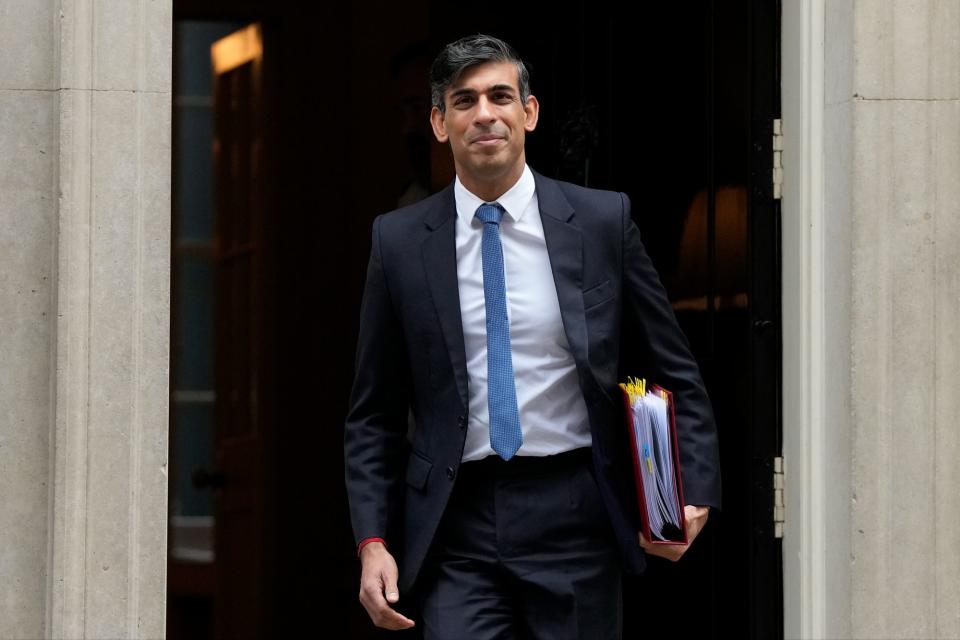
Labour: Nothing will change Tories' 'appalling record'
11:42 , Josh Salisbury
Labour has said nothing Jeremy Hunt does today will change the Tory party's "appalling record".
Shadow Chief Secretary to the Treasury Darren Jones said: "After thirteen years of Tory economic failure, working people are worse off.
"Nothing the Chancellor says or does today can change the Conservative Party’s appalling record.
"Only a Labour government can bring the change this country needs."
After thirteen years of Tory economic failure, working people are worse off.
Nothing the Chancellor says or does today can change the Conservative Party’s appalling record.
Only a Labour government can bring the change this country needs. pic.twitter.com/QVmKFuMMah— Darren Jones MP (@darrenpjones) November 22, 2023
No10: Autumn Statement backs business and rewards workers
11:39 , Josh Salisbury
Jeremy Hunt told Cabinet this morning that his Autumn Statement was one that backs business and rewards workers to get Britain growing, writes political editor Nicholas Cecil.
He particularly pointed to tackling the problem of 100,000 people being signed onto benefits with no requirements to look for work because of sickness or disability, saying that it is a waste of potential that is both economically and morally wrong and that the Back to Work plan would support over a million people to find work.
Prime Minister Rishi Sunak also highlighted previous economic predictions that the UK economy would fall into a recession, saying that the difficult spending decisions taken by the Chancellor and the success in halving inflation had bucked those predictions and restored stability.
He said that as a result, the UK’s economic policy could change gear with a focus on reducing debt, cutting tax and rewarding hard work, building domestic, sustainable energy, backing British business and delivering world-class education
He concluded Cabinet by saying it was no accident that stability had been restored to the economy and that inflation had halved, it was the result of actions taken by the Government.
He said the Government would now turn its focus to the long-term decisions needed to grow the economy further and build a brighter future – with the Autumn Statement delivering on that, according to a statement from No10.
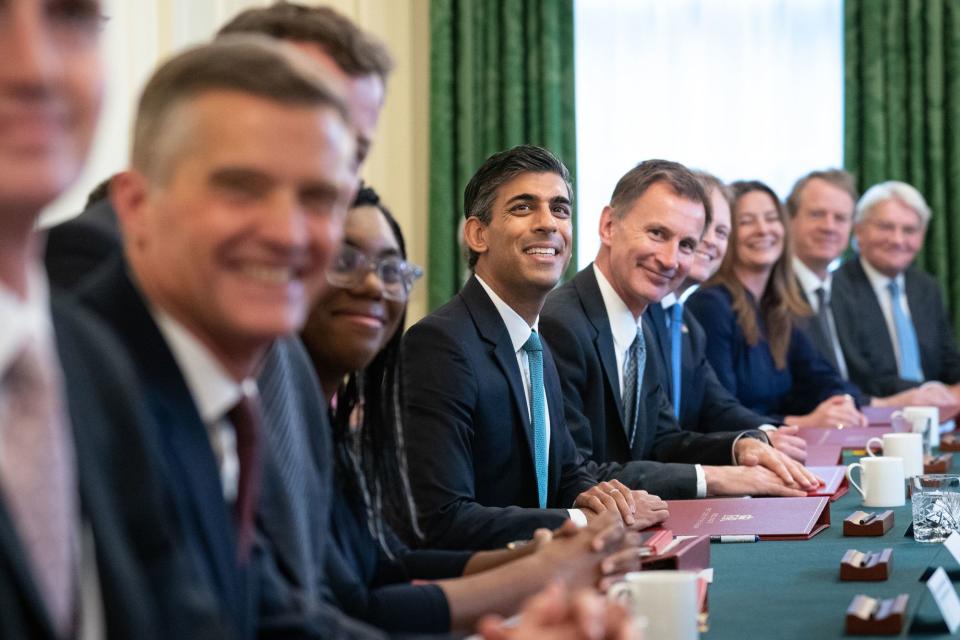
Sunak: Autumn Statement is 'plan for jobs'
11:34 , Josh Salisbury
Rishi Sunak has described the Autumn Statement as a "plan to boost investment, reform public services and create jobs."
He tweeted: "Today the Chancellor will present the Autumn Statement.
"A plan to boost investment, reform public services and create jobs."
Today the Chancellor will present the Autumn Statement.
A plan to boost investment, reform public services and create jobs.
Watch live from HMT channels at 12.30pm👇 https://t.co/djEFU4SaHu— Rishi Sunak (@RishiSunak) November 22, 2023
Jeremy Hunt leaves No11 for Parliament
10:43 , Josh Salisbury
Jeremy Hunt has left No 11 for Parliament where he will present his Autumn Statement.He posed for photographers in Downing Street, holding his copy of the Autumn Statement clad in turquoise blue binding.
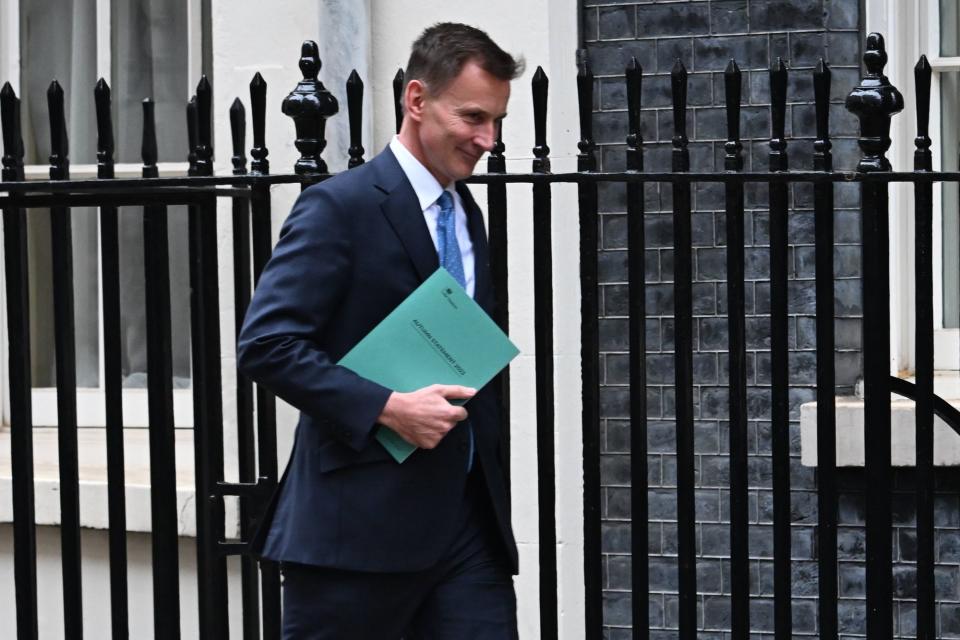
Hunt: Autumn Statement will make 'big difference' to entrepreneurs
10:32 , Josh Salisbury
The Chancellor has said he hoped the Autumn Statement's measures would make a "really big difference" to entrepreneurs.
In a social media video, the Chancellor said the statement had "110 different measures to help grow the British economy".
"I'm thinking of my own business, that I set up over 30 years ago," Mr Hunt said.
"I want to help thousands of other people do what I did, and I hope today will make a really big difference."
— Jeremy Hunt (@Jeremy_Hunt) November 22, 2023
Key timings throughout the day
10:00 , Josh Salisbury
Key timings throughout the day are as follows:
- 8.30am: An earlier than normal Cabinet meeting was held where Jeremy Hunt briefed colleagues on the Autumn Statement.
- 12noon: As is traditional, Rishi Sunak will face off against Keir Starmer at Prime Minister's Questions.
- 12.30pm: Hunt presents his autumn statement to the Commons.
- 2.30pm: The chair of the Office for Budget Responsibility, the independent fiscal watchdog, holds a press conference on the OBR’s forecasts.
Hunt 'likely has about £20bn' wriggle room
09:54 , Josh Salisbury
Harriett Baldwin MP, the Conservative chair of the Commons Treasury Select Committee, said Mr Hunt likely has about £20 billion in fiscal “headroom” after raking in more tax receipts than previously expected.
“If you look at the numbers that the Office for Budget Responsibility has been publishing each month, we think that there's probably about £20 billion of headroom and that's because you and I, through those frozen tax levels and also businesses, we have actually ended up paying more tax this year than was planned in last year's budget,” she told GB News.
“So I think that today gives the Chancellor an opportunity to give some of that back to the hard-working businesses and people of this country so that we can grow the economy more rapidly next year.”
However, Adam Corlett, principal economist at the Resolution Foundation, warned the so-called headroom could be misleading for the months ahead. This means the Chancellor would not the same room for giveaways.
“The fiscal forecast may rely on implausibly low departmental spending,” he tweeted.
“Any extra policy space will be a ‘fiscal illusion’. Government spending power has fallen along with everyone else’s. But with spending plans set in cash terms, the government has not faced up to that.”
Fiscal watchdog to publish updated forecast
09:42 , Josh Salisbury
Alongside Jeremy Hunt's announcement of measures in the Commons, the Office for Budget Responsibility (OBR) will also publish an updated forecast on the Government's finances.
The fiscal watchdog is likely to present a somewhat gloomy forecast over the next few years which takes us well into after the next general election.
It has previously predicted that the economy would shrink by 0.2% in 2023, but that the UK would narrowly avoid going into a recession.
However, it warned in March that once rising prices were taken into account, household incomes were expected to drop by 6% in 2023 and 2024, the largest drop in living standards since just after the war.
It remains to be seen whether the forecasts have brightened. One potential boost for Mr Hunt is an expected increase in tax revenues - although this is largely driven by higher-than-target inflation.
Sir Keir: Tories are party of low growth and high tax
09:24 , Josh Salisbury
Labour's Sir Keir Starmer has got his response to Mr Hunt's Autumn Statement in early - saying the Conservatives are the party of "high tax and low growth".
In a tweet, the Labour leader said: "After thirteen years of the Conservatives, working people are worse off.
"Prices are still rising, energy bills are up and mortgage payments are soaring.
"With 25 tax rises since 2019 the Tories are the party of high tax and low growth."
However, Sir Keir will not be responding to Mr Hunt's statement in the Commons, as this will be left to Labour's Shadow Chancellor, Rachel Reeves.
After thirteen years of the Conservatives, working people are worse off.
Prices are still rising, energy bills are up and mortgage payments are soaring.
With 25 tax rises since 2019 the Tories are the party of high tax and low growth.
I’m proud to lead a changed Labour…— Keir Starmer (@Keir_Starmer) November 22, 2023
What is expected to be in the Autumn Statement?
09:13 , Josh Salisbury
Good morning and welcome to our live coverage of today's political events - which will be dominated by PMQs and then, more importantly, the Autumn Statement.
This is where the Government gives an update on its tax and spending plans.
Some of the key measures which are already confirmed to feature or are widely expected when Jeremy Hunt makes his address in the Commons this afternoon are:
- The minimum wage, known as the 'National Living Wage', will by more than a pound to £11.44 per hour from April next year, and the higher rate will also apply to 21 and 22-year-olds for the first time.
- The Chancellor is expected to cut national insurance contributions, although it is not clear if he will cut the level of tax or the thresholds at which it is payable.
- A tax break for businesses known as 'full expensing' for businesses is set to be extended to 2028-29. It allows companies to deduct spending on investment from profits, reducing their tax liability.
- Around 2 million benefits claimants could lose payments unless they agree to work from home under tougher workfare rules. However, benefits are expected to increase in line with September’s inflation figure of 6.7 percent, rather than a lower inflation rate as previously floated by ministers.


